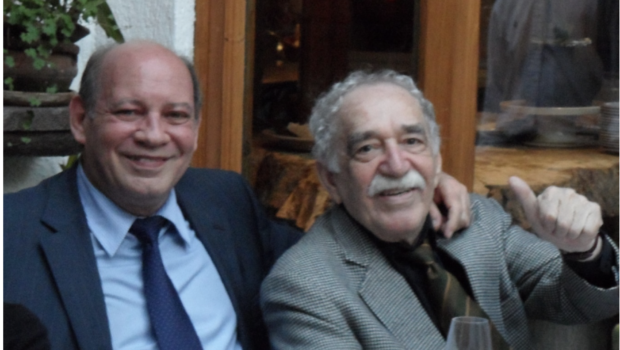Does Evil Exist?
Rob Riemen, Anne Applebaum, Donald Sassoon and Bettina Stangneth
In ‘Waiting for the Barbarians’ (1898), the Greek poet Constantine Cavafy portrays a fictional city grown decadent in times of plenty, where one and all almost eagerly look forward to the arrival of the barbarians. Yet the barbarians do not come, and they are deeply disappointed. Cavafy’s description of this imaginary city ends with the following haunting lines:
And now, what’s to become of us without barbarians.
Those people were a solution of some kind.
(Translated by Daniel Mendelsohn)
The arrival of the barbarians would have offered a way out of the spiritual emptiness, lethargy, boredom and laziness that the city had fallen prey to. Poetically, Cavafy has illustrated the argument put forward by Edward Gibbon in his superb historical epic The Decline and Fall of the Roman Empire (1788): that Roman civilization primarily withered as a result of decay from within, waiting for the barbarians that eventually came. The Nexus Conference addresses this theme within our society: how powerful is our current ideal of civilization? And where is it that evil comes from?
Rob Riemen: All of you have been there. You studied the gulag. You wrote about fascism. You wrote about Eichmann. You’ve seen what is going on in your area of the world. And you know so many things through your movie. So now, the big question: where is it that evil comes from? What is it that through your experience or study you have started to understand about evil?
Anne Applebaum: I would begin with your idea that barbarianism has somehow come back, though I would argue that it never went away. And I would pick up on this point about dehumanization, and about power, that a couple of people have alluded to. Because the human instinct to make oneself better by making others worse—by diminishing, destroying and dehumanizing other people—seems to me very profound, and I don’t have an anthropological or a psychological explanation for it, but, even as some of you have been mentioning about some of the things that have been done around the world, I hear echoes. Being told that your language is not important. Well, when Hitler came into Poland, one of the things he did was tell people they weren’t allowed to speak Polish. So for example, my father-in-law spoke some German. Because when he was a child, he was not allowed to speak Polish in school. He was only supposed to speak German: that was the language of the occupation. When the Soviet Union was seeking to Sovietize Ukraine, starting in the 1930s, what did they do? They eliminated the language. And so, the attempt to eliminate other cultures through eliminating language, or symbols, or religion. Or through downplaying: our religion is better than yours. Incidentally, I have mixed feelings about the word religion because, although I do believe that of course the acts we saw in Paris last night are connected to radical Islam, and they are an interpretation of Islam, I think that’s very different from saying that they are about religion. Radical communism—the Bolshevism that was used to excuse the murder of millions of people—had a lot in common linguistically with the language of the moderate left. They sometimes read the same texts. But the interpretation of Marx and the way he was used to gain and maintain power and discriminate against enemies was very specific. So the radical Islamist’s use of a religion in a very specific way is very similar to the Nazi use of national ideas, or the Soviet use of communist ideas. Religion in that sense isn’t different; this is the contemporary form of expressing that kind of fanaticism. But we’ve seen it before, and many of the techniques and patterns are very similar. I’m no theologian or psychiatrist, but clearly there is something innate. There are some people who desire to think in this way; it has expressed itself in different forms at different times, and it doesn’t go away. The only thing we can do is find moderate language in which to speak about it, and to try to create political institutions and incentives which reduce its range. And we did that in Europe after the Second World War, and we did have an alternate ideology, an alternate way of thinking. The question is whether that is now strong enough to motivate new generations or not.
Bettina Stangneth: I think we can do a little bit more: we can stop accepting every explanation. We are so eager to understand what happened that we listen very carefully to the explanations that are given to us. We try to be psychologists. Explanations are welcomed, and to hear the reasons of a perpetrator is something we like. Why? Why couldn’t we say, “don’t you dare tell me that there is a reason for this act, for this behavior”? We have to deny some explanations. We have to say, “Sorry, people, there is no explanation for ‘special deeds.’” And we have to concentrate on the deeds.
Marian Turski: But if we don’t look for an explanation, we shan’t have any solutions. If you have excluded, frustrated, and alienated people, this is also the basis for what you call barbarism.
Bettina Stangneth: Yes, but there’s a difference between having a scientific interest in explanations and finding the origins of evil. Even for young people. They need to know what is a real explanation and what is not, what is a true way to think and what is only a way to refuse justification, or responsibility. And we have to ask, what can we do?
Marian Tursk: I have asked some of my best friends, how do you associate with barbarianism? Of course, first it was ISIS, a terrorist organization; but they may also identify barbarianism with tabloids, modern TV, the behavior of the fans of sporting clubs. There is also barbarianism in customs and habits. Which, in a way, could be a step to another type of barbarianism.
Donald Sassoon: I would agree with you, but barbarianism is such a ridiculously inflated word, one that is used and deployed against people we don’t like. This morning we listened to some pop music at breakfast for about three minutes, and I thought, “why don’t they stop this barbaric music?” as I was reading on my iPad about the really barbaric events in Paris. So we do have this very generic word, but we need explanations. I’m sorry, my job is to find explanations, not justifications. I don’t need a job in order to justify or not to justify, I can condemn like everyone else; this is a human right. But my job is to try to find an explanation. Why is it that these people, whether it’s a small group, or the gulag, or Nazi Germany, do what they do? And here we have two different typologies of evil, what you call state-induced or let’s take it a bit further, culturally induced—you are part of a culture which justifies whatever it is they are about to do, you are conformist, you are part of a group—and then there is the other kind of evil: you are a non-conformist, you go completely against the grain. The people who did what they did last night were both. They were conforming to what they thought was an ideology, and therefore taking enormous self-satisfaction, presumably because they were part of this grandiose project, and so on. And at the same time, they were acting like anti-bourgeois terrorists. They were saying, “Ah, look what we are doing! We are going to scare all of you, we are going to change France.” Wow! What a fantastic moment of power they had.
Anne Applebaum: It’s very Bolshevik.
Donald Sassoon: Well you can call it Bolshevik, but frankly, go back in history! It’s one after the other. It is absolutely nothing new, unfortunately. One of the bad things about being a historian—why many people don’t like us, really—is because we are terribly boring. Because commentators, and social scientists, and journalists, and so on say “this is a new thing, this has never happened before,” and then we arrive, and say, “Actually, it did happen before.” How tedious! Once there was a fish scientist—and I’m sure this is made up—who saw that goldfish going around a particular bowl take about seven seconds, and because their memory is only seven seconds, they have the most fantastic lives, because they keep on saying, “Wow! I’ve never been here before! This is really exciting.” The historian is the fish with an eight-second memory who goes behind and says, “Nah, you were there seven seconds ago!”
Bettina Stangneth: But sometimes historians—and I am only a philosopher, so I cannot say—are so eager to find examples fitting their theories, that they are not able to see new things. A new problem dealing with explanations is that we have very intelligent and experienced liars. They knew of our love for wisdom, for explanations; of our curiosity and our will to understand. And they are able to give us explanations we want to hear. Eichmann is one example. He knew perfectly well what people wanted to see and wanted to hear, and he gave it to them. Even the cleverest people fall into the trap of these lies. So I think we should talk a bit more about our expectations about what could be an explanation for evil. We want to understand them, we really want to understand them, and this makes us weak sometimes.
This transcript has been edited for content and length. Special thanks to the Nexus Institute
Posted: April 24, 2016 at 9:32 pm










